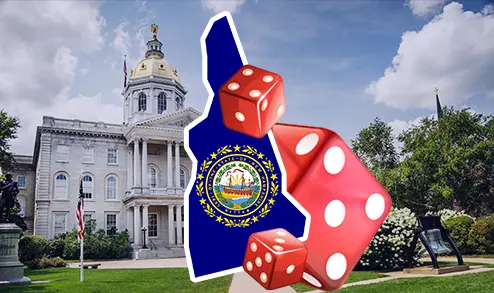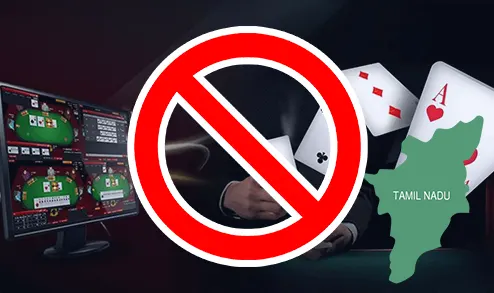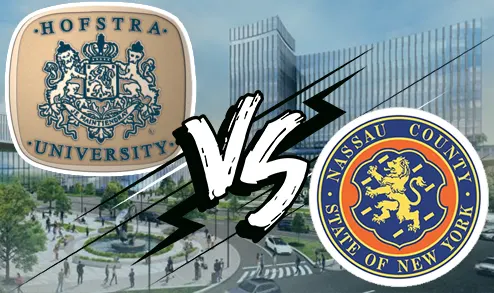 Online casino legislation seeking to legalize table games in New Hampshire passed the Senate on March 30 and is now being considered by the House. During an hour-long hearing, the legislators discussed how the bill would legalize online table games and fund higher education.
Online casino legislation seeking to legalize table games in New Hampshire passed the Senate on March 30 and is now being considered by the House. During an hour-long hearing, the legislators discussed how the bill would legalize online table games and fund higher education.
The lottery would be tasked with granting licenses to potential operators, who must go through a bidding process before they receive permission to operate in the state. The legal age to gamble in New Hampshire would be 18 years old.
Online Table Games May Soon Be Legalized in New Hampshire
The New Hampshire House held a hearing on Tuesday for Senate Bill 104, which would legalize online table games if approved. Experts see this as an important step forward for the state because it would provide New Hampshire residents with more entertainment options and raise funds for higher education. The bill, however, will not legalize slot machines.
Operators interested in entering the market must go through a bidding process. The ones that offer the highest tax rate would receive a license. A state legislative analysis projected that three to five operators will obtain licenses, and the bidding tax rate will be around 35%. The New Hampshire Lottery Commission estimated that online casino games could generate $25 million in the first three years of operations, which would go to scholarship funds.
Under the provisions of the bill, no cap will apply to wagers placed on online games. But according to state law, charitable gambling facilities must comply with a maximum bet limit of $10. However, there are some bills in the legislature seeking to increase this ceiling.
Arguments For and Against Gambling Expansion in New Hampshire
Currently, casinos are obliged to donate 35% of their profits to charities. According to recent information, casinos generated approximately $20 million for nonprofit organizations in the last fiscal year. During the hearing held on Tuesday in the New Hampshire House Ways and Means Committee, benefactors explained that online casinos would affect their revenues and the amount they earmark to such organizations.
Head of Meals on Wheels of Hillsborough County, Jon Eriquezzo, used an interesting metaphor to describe the situation. He said that if you squeeze a balloon on one side, it will get smaller on the other.
Supporters of the bill argued that online casinos would not change people’s habits who are used to visiting gambling facilities but attract new players. Sen. Timothy Lang, the main sponsor of the bill, told legislators that many New Hampshire residents gamble online even though online gambling is prohibited in the state. He added that legalizing online gambling will ensure better consumer protection and boost the state’s workforce.
 This Monday, the hearing into an alleged match-fixing scandal, which includes ten Chinese snooker players who are currently suspended, started. The hearing is expected to take up to two weeks, and after that, findings will be made public. Based on the findings revealed during the hearing process, the World Professional Billiards and Snooker Association will decide how to punish the ten players.
This Monday, the hearing into an alleged match-fixing scandal, which includes ten Chinese snooker players who are currently suspended, started. The hearing is expected to take up to two weeks, and after that, findings will be made public. Based on the findings revealed during the hearing process, the World Professional Billiards and Snooker Association will decide how to punish the ten players.  The new gambling law prohibiting users from Tamil Nadu from playing poker and rummy online came into effect on April 21. On April 10, Governor R.N. Ravi gave assent to a bill, which seeks to prohibit online gambling and classify poker and rummy as games of chance.
The new gambling law prohibiting users from Tamil Nadu from playing poker and rummy online came into effect on April 21. On April 10, Governor R.N. Ravi gave assent to a bill, which seeks to prohibit online gambling and classify poker and rummy as games of chance.  Last Friday, Alberta’s top court upheld a lower court decision, according to which Alberta’s gambling regulator has the statutory authority to launch a dedicated gambling platform. The decision may finally put an end to the legal battle between Tsuu T’ina Gaming and the regulator.
Last Friday, Alberta’s top court upheld a lower court decision, according to which Alberta’s gambling regulator has the statutory authority to launch a dedicated gambling platform. The decision may finally put an end to the legal battle between Tsuu T’ina Gaming and the regulator.  The House and Governor Maura Healey once again expressed their support for the bill seeking to legalize the sales of online lottery tickets, pushing the Senate to approve the legislation. According to Democrats, the state would generate $200 million in revenue if the measure passes, and the funds would be used for early education and child care stabilization grants. Speaking in front of the Joint Committee on Consumer Protection and Professional Licensure last Thursday, Senator John Cronin said that the matter is being discussed actively in his chamber.
The House and Governor Maura Healey once again expressed their support for the bill seeking to legalize the sales of online lottery tickets, pushing the Senate to approve the legislation. According to Democrats, the state would generate $200 million in revenue if the measure passes, and the funds would be used for early education and child care stabilization grants. Speaking in front of the Joint Committee on Consumer Protection and Professional Licensure last Thursday, Senator John Cronin said that the matter is being discussed actively in his chamber.  On Thursday, Las Vegas Metropolitan Police detained a 33-year-old man accused of six counts of robbery with a deadly weapon, two counts of attempted robbery with a deadly weapon, 11 counts of burglary with a deadly weapon, and five counts of grand larceny of a vehicle. According to the police, the man has a lengthy criminal record in Las Vegas.
On Thursday, Las Vegas Metropolitan Police detained a 33-year-old man accused of six counts of robbery with a deadly weapon, two counts of attempted robbery with a deadly weapon, 11 counts of burglary with a deadly weapon, and five counts of grand larceny of a vehicle. According to the police, the man has a lengthy criminal record in Las Vegas. Earlier this week, the Confederated Tribes of the Colville Reservation confirmed that they had submitted an application for putting the tribe-owned property in Pasco into trust with the Bureau of Indian Affairs (BIA) in Portland. This is the first step of a 16-step federal process for the transfer of off-reservation tribal fee property to trust status. The BIA and the Department of the Interior may require the tribes to go through more processes because the land will be used for building a gambling venue.
Earlier this week, the Confederated Tribes of the Colville Reservation confirmed that they had submitted an application for putting the tribe-owned property in Pasco into trust with the Bureau of Indian Affairs (BIA) in Portland. This is the first step of a 16-step federal process for the transfer of off-reservation tribal fee property to trust status. The BIA and the Department of the Interior may require the tribes to go through more processes because the land will be used for building a gambling venue.  On Wednesday, the Ontario Lottery and Gaming Corp. (OLG) announced that it paid the City of Niagara Falls the staggering amount of $3.93 million for the three-month period, starting from January 1, for hosting Casino Niagara and the Fallsview Casino Resort. However, the total is down compared to the payment of $4.4 million, which the city received in January last year.
On Wednesday, the Ontario Lottery and Gaming Corp. (OLG) announced that it paid the City of Niagara Falls the staggering amount of $3.93 million for the three-month period, starting from January 1, for hosting Casino Niagara and the Fallsview Casino Resort. However, the total is down compared to the payment of $4.4 million, which the city received in January last year. On Wednesday morning, Kenya’s parliament discussed a bill that would replace the existing Betting and Lotteries Act and regulate gambling and sports betting in the country if approved. Nyeri Town MP Duncan Mathenge moved the motion regarding the regulation of the industry and explained that the country will be able to protect youths from problem gambling if the practice is controlled.
On Wednesday morning, Kenya’s parliament discussed a bill that would replace the existing Betting and Lotteries Act and regulate gambling and sports betting in the country if approved. Nyeri Town MP Duncan Mathenge moved the motion regarding the regulation of the industry and explained that the country will be able to protect youths from problem gambling if the practice is controlled.  On Tuesday, Hofstra University filed a lawsuit against the Nassau County Planning Commission in State Supreme Court in Mineola, claiming that the commission violated state open meeting laws.
On Tuesday, Hofstra University filed a lawsuit against the Nassau County Planning Commission in State Supreme Court in Mineola, claiming that the commission violated state open meeting laws.